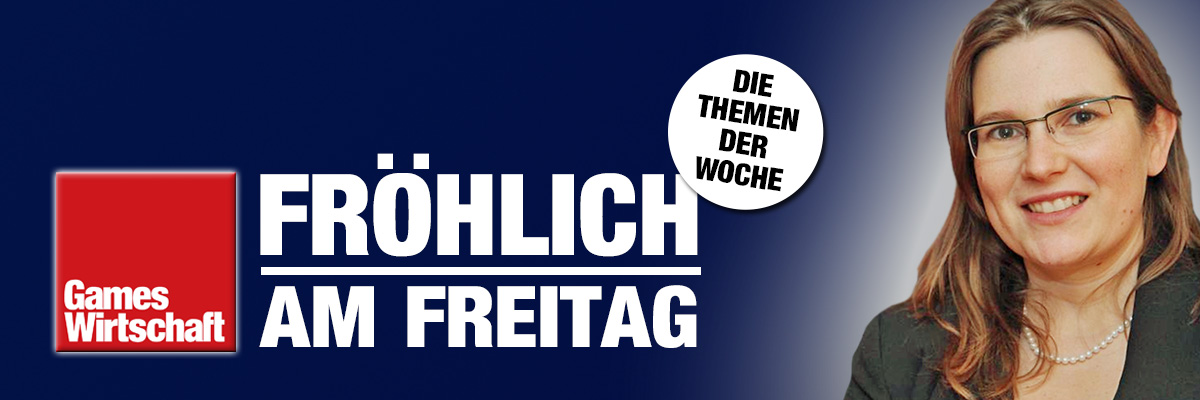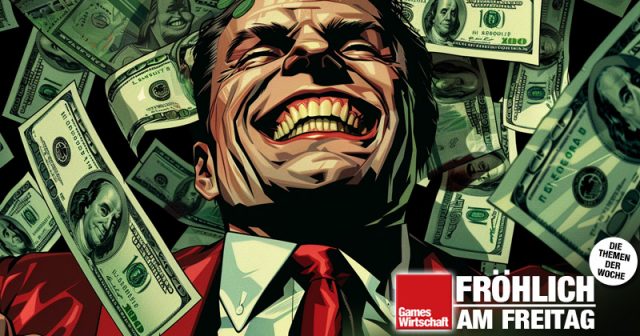Advertisement
The situation in the German games industry also has to do with the fact that it has sold off its independence – in favor of larger bets.
Dear GamesWirtschaft reader,
Dear GamesWirtschaft reader,
In the 80s and 90s ZDF had the wonderful tradition of the 'Christmas series' – a multi-part series that (you guessed it) always ran during the holidays. The ratings: astronomical. The main actors of Silas, Patrick Pacard or Anna became stars of their generation, including Bravo star editing.
The series began in 1979 Tim Thaler, based on the novel of the same name by James Krüss. 13-year-old Timm – played by Thomas 'Tommi' Ohrner – wants to help his financially struggling family by making a pact with the equally humorless and extremely rich Baron de Lefuet and swapping his disarming laugh for the ability to win every bet.
Advertisement
Last week, this childhood memory was triggered again when an industrialist in the computer game price environment noted rather casually that Germany's industry had “Her laughter sells”.
What is meant is the fact that entrepreneurs have given up their business for one-, two-, three-, four-digit million amounts (also) in the expectation that they will subsequently be able to make more and larger bets – or at least increase the probabilities. This has been fulfilled in that the projects and budgets have noticeably increased in many places since then. The greater scope becomes visible to the outside world through lavish company outings and the sometimes lavish furnishings of the rooms in premium locations.
But many people in the industry haven't really felt like laughing recently. All the 'restructuring', the layoffs, the project stops, the location closures of the past few months have primarily to do with the fact that the international headquarters are 'governing' – without the local subsidiaries and their branch managers putting up much resistance could.

What that does to the workforce, Adrian Goersch gave a much-noticed and ruthless lecture on this at the Reboot developer conference in Dubrovnik, Croatia this week. Goersch is one of the founders and managing directors of Black Forest Games in Offenburg, Baden, and has been part of THQ Nordic since 2017. The crisis at the Swedish THQ Nordic parent Embracer also has that Destroy All Humans!-Makers dragged underwater: In January it was announced that half of the 110 employees would lose their jobs. The process was never officially communicated – unlike in the similar case of the Embracer subsidiary Fishlabs in Hamburg.
On the reboot stage, Goersch has now revealed his emotional state, report participants. He had to accept for himself that the role of the 'bad guy' would inevitably fall to him as soon as he gave notice of termination – and that there was no point in struggling with things that he couldn't change. The private and professional effects on those affected and their families are dramatic, in every single case. Quote: “I won't be able to sleep well until I know that each of them has a new job – or we bring them back to Black Forest Games.”
Black Forest Games occupies places 6 and 12 in the list of the largest games projects in games funding – and thus bears witness to how the federal government does one thing first and foremost: place bets. Namely, betting that subsidized products will work on the market and that sustainable companies with sustainable jobs will emerge as a result. Some of these bets work out – but the vast majority don't. What won't surprise anyone who deals with the matter: games development was, is and remains a hit business.
At the time of my computer game price small talk, I never dreamed that a medium-sized bomb would be detonated a few days later – namely on Monday at 7 a.m. On page 2 of the relevant presentation it says succinctly: “The start of a new chapter”, so the beginning of a new chapter. As if the company logo had been relaunched.
In fact, the huge Embracer group is crumbling into three blocks of roughly equal size, which are being listed on the Stockholm Stock Exchange as independent stock companies. Significant parts of the company with over 5,000 employees had previously been sold.
The effects on the games landscape in German-speaking countries are immense and not even remotely foreseeable. One thing is certain: Black Forest Games, together with THQ Nordic (Vienna), Deca Games (Berlin) and many, many other locations, will be part of a company with the working title 'Coffee Stain & Friends', which focuses on A and AA games, i.e. games with small and medium-sized budgets.
Other Embracer branches are slipping under the umbrella of the soon-to-be-competing Middle-Earth Enterprises & Friends, including the Hamburg studio Fishlabs and the Munich distributor and publisher Plaion, which opened a premium logistics center in the Tyrolean border town of Höfen just a few years ago. Address: Embracer-Platz 1.
Embracer founder Lars Wingefors was only a few millimeters away from this a year agoto sell his shy Swedish smile to the Saudis in order to be able to continue placing big bets in the M&A casino. The negotiations with the major Arab shareholders failed – and Embracer had no choice but to quickly and thoroughly, some say radically, reduce the billions in debt it had accumulated.
At this point in time, it had already become apparent that the aggressive business model was beginning to crack, as Wingefors itself admits: The Corona party was over, the geopolitical situation (keyword: Russia) had become darker, as well as higher interest rates on the capital market and the reluctance of investors and consumers – and of course the not always convincing product quality of flops like this Saints Row.
Such products can be reliably identified in annual reports by the fact that: 'Long sellers' I'm talking about the commercial expectations of management “not yet” would have fulfilled. In the end it all comes down to the same thing: the employees are the first to be hit when the associated studio – here: Volition – is wiped out, five years after it was taken over by Embracer.
I'm definitely not giving away too many spoilers when I reveal itthat Timm Thaler will ultimately be able to shine again in the final 13th episode of the series. The industry is still a long way from such a happy ending. But if I had to bet, I would at least guess that in the coming months many entrepreneurs will get their smile back – by starting over and/or buying back shares. Like Dieter Schoeller, who separated his indie publisher Headup from the ailing Thunderful construct.
By far the biggest bet was made by Ralf Reichert: The head of ESL Gaming sold his Cologne-based e-sports organizer to Saudi Arabia two years ago – for a billion dollars. It wasn't until February that one in seven jobs were cut. And in the coming months, at the behest of the sheikhs, Ralf Reichert will ensure that the inaugural Esports World Cup is a success.
And do not forget: Always smile and wave.
We wish you a nice weekend
Petra Fröhlich
Editor-in-chief of GamesWirtschaft
Always Fridays, always free: Subscribe to the GamesWirtschaft newsletter now!
GamesWirtschaft on social media: LinkedIn ● Facebook ● X ● threads ● Bluesky
